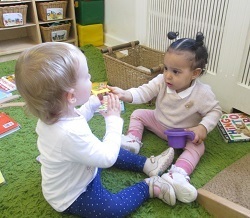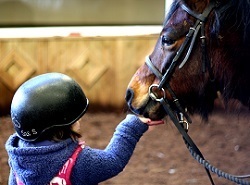Programmed to Be Kind
If I were to ask parents what they worry about most at the start of a new school year, one theme will always pop up: will my child make friends and be happy? Plenty of advice is offered from a wide range of sources about how to encourage friendships and social skills, but one vital yet deceptively simple suggestion rarely gets a mention – the importance of being kind.
I have just finished writing a book about the fascinating concept of ‘Paying it Forward’ – this is the idea of performing random act of kindness for other people and asking them to ‘pay it forward’ by being kind to someone else, rather than trying to pay you back. Thus, for example, I might treat a perfect stranger to a coffee (as indeed I did as part of research for the book) and ask them to pay it forward by doing something nice for someone else. In this way, kindness can spread like a benign virus across the globe, to replace the hate and selfishness that seems so endemic in today’s society. The book, Paying It Forward: How one cup of coffee can change the world* examines research into altruistic and kind behaviour – and I discovered whilst writing it that there are many surprising benefits to being kind for kids as well as adults.
One study, for example, was designed to see what would happen when 9-11 year old children performed acts of kindnesses for four weeks. The results showed that these youngsters ended up feeling happier than those who didn’t. This was not surprising – many studies have shown that kind people are happy people. But what was really interesting was that these children were also more accepting and tolerant of their peers than those who hadn’t performed the random acts of kindness. Being kind then, seems to make children nicer people – and nicer kids seem to attract friends.
 Children are actually programmed to be kind; another study in my book showed that when toddlers see an adult (who they don’t know) whose hands are full and who needs assistance opening a door or picking up a dropped object, they help. The fact that this urge to aid others appears so early (as young as 18 months) suggests that this is not learned, but innate behaviour that we are born with.
Children are actually programmed to be kind; another study in my book showed that when toddlers see an adult (who they don’t know) whose hands are full and who needs assistance opening a door or picking up a dropped object, they help. The fact that this urge to aid others appears so early (as young as 18 months) suggests that this is not learned, but innate behaviour that we are born with.
This desire to help doesn’t always survive the growing up process however, with many forces conspiring to quash kids’ natural urges to be helpful; peer pressure, selfish desires and simply lack of thought are some such factors. Yet all the evidence suggests that kids who are kind are happier, have higher self-esteem and are even healthier – all the qualities that, if we could wave a magic wand, we would want to bestow on our kids at the start of the new academic year.
 So, how can we encourage our kids to be kind? The simplest way is by what is called ‘vicarious modelling’ – this just means that if they see mum or dad being helpful and performing random acts of kindness, they will learn to do so too. This is what the ‘pay it forward’ campaign, that I am hoping will be kickstarted by my book, is aiming to achieve: spreading the kindness so that it becomes a norm. Let them see you buying coffee for someone you don’t know, giving up your seat, dropping coins in charity boxes, donating food to foodbanks, complimenting people, letting drivers cut in front of you, being pleasant to cold callers – my book is full of ideas, as is the website of the Pay It Forward Foundation (the Founder of whom wrote the Forward for my book).
So, how can we encourage our kids to be kind? The simplest way is by what is called ‘vicarious modelling’ – this just means that if they see mum or dad being helpful and performing random acts of kindness, they will learn to do so too. This is what the ‘pay it forward’ campaign, that I am hoping will be kickstarted by my book, is aiming to achieve: spreading the kindness so that it becomes a norm. Let them see you buying coffee for someone you don’t know, giving up your seat, dropping coins in charity boxes, donating food to foodbanks, complimenting people, letting drivers cut in front of you, being pleasant to cold callers – my book is full of ideas, as is the website of the Pay It Forward Foundation (the Founder of whom wrote the Forward for my book).
Children are much more receptive to pay it forward/acts of kindness campaigns than adults (who I found, tend to be a bit suspicious of stranger kindness) and my book is crammed with stories of schools and individual children who have created their own kindness initiatives. Your primary-aged child will love the idea of kindness for kindness’s sake and will probably come up with lots of ideas; talking to lonely children in the playground, lending items from pencil cases, letting other kids in front in the dinner queue, comforting someone who is hurt etc.
You could also suggest that the school undertake their own kindness campaigns. There are many lovely examples of schools across the UK and beyond who have done this – one fabulous case was the school whose older pupils in Year 6 were tasked with trying to ‘catch’ younger ones being kind and awarding them kindness stickers when they did.
Encouraging kids to be kinder has so many benefits for both the giver and receiver that it may well be the best skill to send your child off with at the start of the new academic year. And because kindness spreads, just imagine what your child could begin this year!






